Insolvency and Company Property: The Effect on Jointly Owned Business Assets in Australia
 This article will explore the implications of insolvency for jointly owned assets. Understanding how insolvency impacts shared business assets is crucial for co-owners, creditors, and stakeholders facing such situations.
This article will explore the implications of insolvency for jointly owned assets. Understanding how insolvency impacts shared business assets is crucial for co-owners, creditors, and stakeholders facing such situations.
At the Insolvency Advisory Centre, we can help you navigate the complexities of a jointly owned business or property during the insolvency process, giving you options so that you can make informed decisions.
Jointly Owned Business Assets
Jointly owned business assets refer to assets held by multiple parties, such as business partners or shareholders, who share ownership rights and responsibilities. These assets can include physical property, equipment, intellectual property, or shares in a company.
Insolvency Overview
Insolvency occurs when a business entity cannot meet its financial obligations, including paying debts as they become due. In Australia, insolvency proceedings can take various forms, such as liquidation, voluntary administration, or Deed of Company Agreement, depending on the circumstances.
Implications of Insolvency on Jointly Owned Assets
When a business with jointly owned assets faces insolvency, several implications must be considered:
Asset Liquidation
In insolvency proceedings, the appointed administrator or liquidator may need to sell or liquidate business assets to repay creditors. This process can impact jointly owned assets, potentially leading to their sale or distribution to satisfy outstanding debts.
Co-Owner Agreements
Existing co-owner agreements or shareholders’ agreements may impact the outcome of insolvency proceedings. These agreements may dictate how jointly owned assets are managed, sold, or distributed in the event of insolvency. If there is a dispute between the asset co-owners, then a mediation process may need to happen to find a suitable resolution.
Creditor Claims
Creditors of the insolvent business may have claims against the jointly owned assets if they are considered part of the company’s assets. Creditors can seek repayment from these assets to satisfy debts the business owes.
Valuation and Appraisal
Valuation and appraisal of jointly owned assets may be necessary to determine their value and contribution to the insolvency process. Accurate valuation can help in the equitable distribution or sale of assets.
Co-Owner Liability
Co-owners may be personally liable for the company’s debts in certain circumstances. Understanding the extent of personal liability and protecting personal assets is crucial.
Legal Considerations and Protection
To navigate the impact of insolvency on jointly owned business assets, consider the following legal considerations and protective measures:
- Co-Owner Agreements: The team at the Insolvency Advisory Centre can help you review and understand any co-owner agreements or shareholders’ agreements in place. These agreements may contain provisions regarding asset management during insolvency.
- Expert Advice: Seek expert advice from professionals experienced in business insolvency, such as the Liquidation Insolvency Advisory Centre team, who can provide you with the guidance you need on protecting your interests and assets during the insolvency process.
- Asset Valuation: Ensure jointly owned assets are accurately valued to determine their contribution to the insolvency proceedings and potential distribution.
- Asset Protection: Explore options for protecting jointly owned assets, such as negotiating with the administrator or liquidator to retain ownership or purchasing the assets from the insolvency estate.
- Personal Liability: Understand the potential personal liability as a co-owner and take measures to protect personal assets from being used to satisfy business debts.
Jointly Owned Assets in Insolvency
Insolvency can have significant implications for jointly owned business assets. Co-owners, creditors, and stakeholders must be aware of their rights, responsibilities, and legal protections when dealing with jointly owned assets during insolvency proceedings. The team at the Insolvency Advisory Centre can give you the information you need to make informed decisions. Seeking expert advice, understanding the existing agreements, and taking proactive steps to protect assets are essential in managing the impact of insolvency on jointly owned business assets.
Why not contact us for a free consultation and learn more about jointly owned assets during insolvency?
Andrew Bell Insolvency Advisor
Let’s Talk
With over 30 years of experience in debt solutions and insolvency in Australia, Andrew can find a solution for you.
“Nothing is more satisfying to me than knowing that I’ve helped someone get back on their feet by guiding them through the Insolvency Process. Rest assured; you’re in good hands with me as we solve your financial problems together.”

